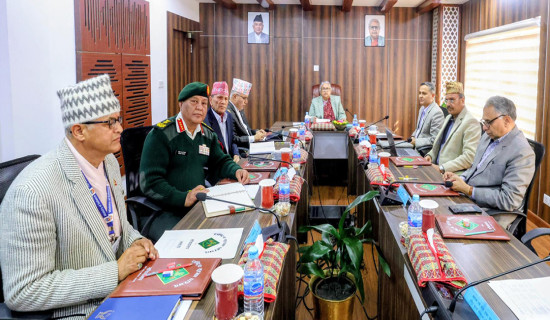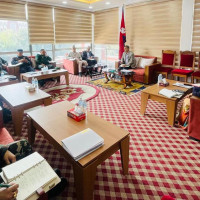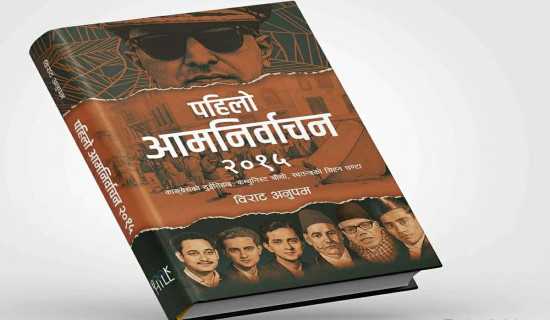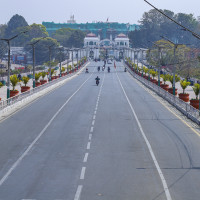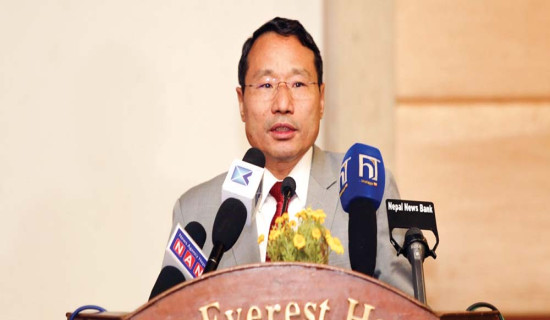- Thursday, 5 March 2026
A Memorable Cultural Experience
My recent visit to China to attend a seminar on economic and trade cooperation organised by the Beijing-based University of International Business and Economics (UIBE) was full of cultural surprises. Before landing in the Chinese capital, the initial pictures flying across my mind were of a bustling and noisy metropolitan city that cared about nothing but daily business in hectic modern ways with little time left for leisurely cultural interactions, listening to people's ordinary concerns, and finding time for conversations with foreign visitors like us.
But to my astonishment, the city was full of people with friendliness, hospitality, politeness, smiles, receptiveness, ready gestures for help, and willingness for conversation. I am not talking only about our host friends from the inviting institution, UIBE, the hotel's front desk receptionist, or the restaurant's servers. One could easily find friendliness in an average person, a taxi driver, or young people taking pictures of the blooming roses in the southern compound wall of the university.
I found the Chinese capital city homely and beautiful with its peak flowering gardens of the season, clean thoroughfares and footpaths without crowds, hosts with a deep sense of care and hospitality, food with breathtaking variety, and a friendly environment where a foreign visitor can feel at home and have a sense of belonging. The only thing that came with strictness and uncompromising ruling was punctuality. Reminders about punctuality and careful handling of one's passports came repeatedly. "Please be punctual, and don't make the rest of your friends suffer because you are late," our senior guide said during an evening tour of Shanghai Bund.
"After seeing around or shopping, if you are too late to return to the specified spot before getting to the bus, you will have to take a taxi on your own to get back to your hotel," he warned.
When returning from a trip to a shopping mall in Shanghai one evening, we lost our way to get back to our hotel. We were offline, as we had not yet purchased a Chinese SIM card. Even though one of my friends from Nepal was a fluent Chinese speaker and had visited China multiple times, we had difficulty navigating to the Holiday Inn Express. We stopped a young cyclist and asked for his help to show us the way. He took out his mobile phone and checked the map. We learnt that we were heading opposite to where we had to go. The young man showed us the right way and guided us to the hotel. How many thanks should we be showering on him? Tonnes.
The UIBE seminar included 32 participants from nine Southeast Asia, Africa, and Middle East nations. However, the most significant number of invitees, including this scribe, were from Nepal. There were opportunities to try Chinese musical instruments, indoor games, art, and eating with chopsticks. The Great Wall was on the prominent cultural outing list. I felt the Nepal-China cultural bond echoing in all its sweetness when Chinese female artists gave a performance with the Chinese musical instrument Zither (Guzheng) and Erhu at the welcome ceremony at UIBE, and later, I played a bamboo flute on the Great Wall with accompanying Nepali friends joining me in clapping and dancing in joy. Being visitors from China's immediate southern neighbour mattered a lot in adding a new brick in friendship and cultural exchange at the institutional and individual levels, with fond memories for the future.
It should be noted here that many foreign tourists visiting Nepal now are from China. More and more Nepali students have been going to study at Chinese universities in recent years. We learnt that about 18 Nepali students studied at UIBE in different faculties. We were happy to meet and talk with some of them. While the Nepali Ambassador to China, Dr Krishna Prasad Oli, organised a dinner meeting for the visiting Nepali team at his office, Chet Nath Acharya from China Radio International (CRI) arrived in the UIBE seminar room to meet and talk with us.
During a shopping trip to a mall, 40 minutes' drive from Beijing Orange Hotel, where we were staying, we had difficulty calling and paying for a taxi online because we didn't have a Chinese SIM card in our mobile phone. One of the shop owners kindly offered to help us to call a cab online. As we lacked an account to pay online, we paid him in cash for the online payment he made for the cab. There were instances when Chinese friends provided us with an internet hotspot when we had to make an urgent WeChat call to our friends and Chinese guides back in the hotel. Such situations made me think purchasing a Chinese SIM was necessary for daily communication. An English language student at UIBE, Chen Jun Liang, also known as Jayden, was ready to help my friend Ram Prasad and me. He took us to the China Mobile office, which is half a kilometre from the university, and helped us purchase a SIM card.
There were memorable cultural gatherings to celebrate the birthdays of Nepali friends, as well as our guide, May Zhang, who was with us and readily solved our problems throughout the trip. She is named May because she was born on the first of May. "This is the first time I'm having an international celebration of my birthday," she said and was moved to tears when we handed her very modest gifts.
Participating in this (late April to early May) seminar at UIBE, which runs 1440 undergraduate classes, 780 postgraduate classes, and 68 doctoral programmes, was a unique experience where we attended classes lectured by senior professors and assistant professors on different topics ranging from Chinese culture and philosophy to trade, technology and economic cooperation. As if we were the university's regular students, we attended classes from 9 in the morning to 5 in the afternoon, with a small break for lunch in between. Hotel and dinner places were strategically booked within a minute's walk from the university for the convenience of the participants.
A teacher and an administrative staff member were prominent people to lead the international team during the seminar and four-day field visit to Shanghai's financial and business hub. Two graduate students had volunteered to work as our guides throughout the programme. Another student had volunteered as a photographer to cover the event in photos and videos presented at the closing ceremony.
While handing over the participation and alumni certificates to us at the closing ceremony, UIBE Vice President Professor Chen Deqiu said, 'You now are the affiliated members of our university, and through you, we want to share our knowledge and progress of development and prosperity. In charge of the seminar, Wang Shuyue said she was eager to welcome us to China again.



